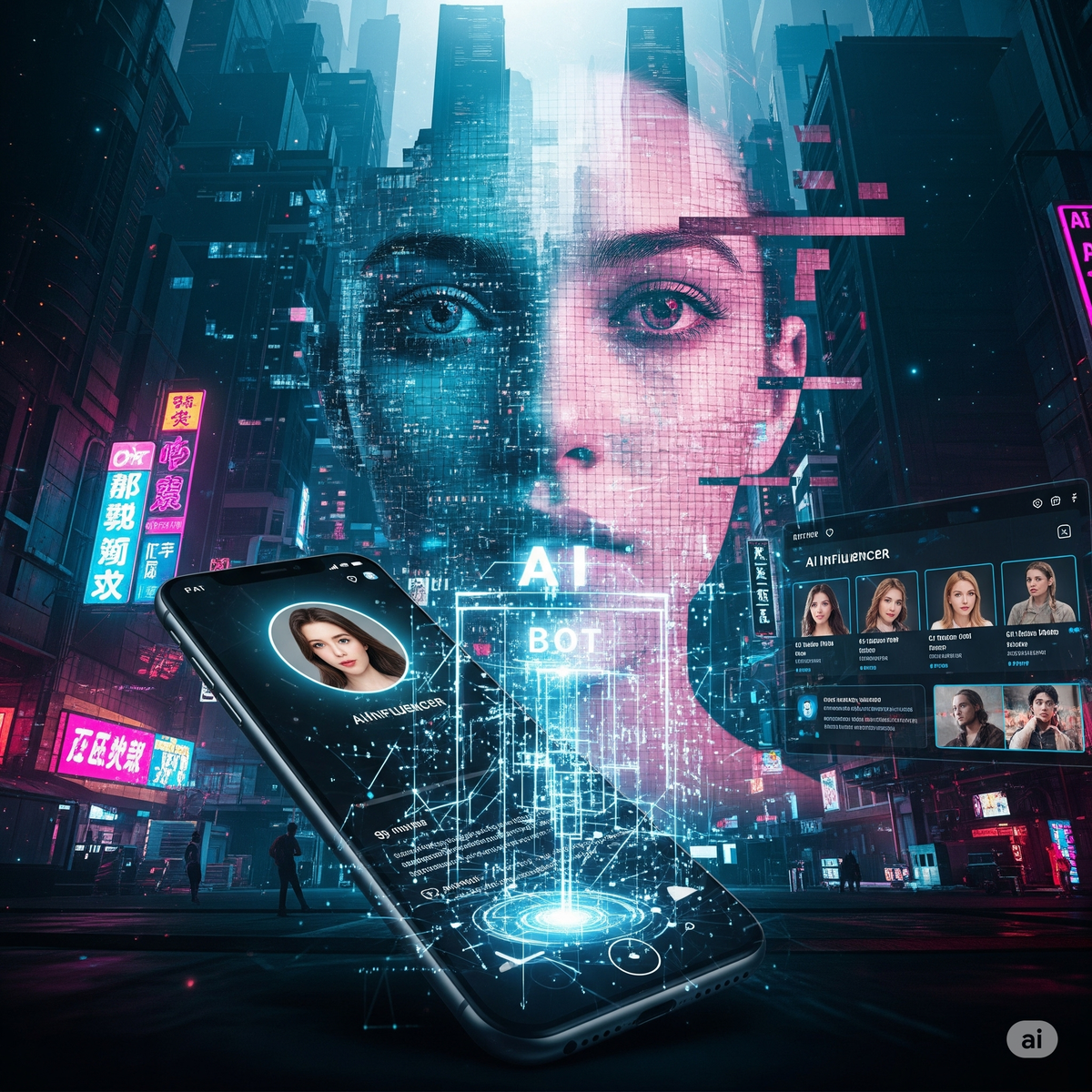Catfish.exe: The Rise of AI-Influencer Fraud and the Digital Identity Crisis
In 2025, the influencer you follow might not be real. AI-generated personas are flooding Instagram, TikTok, and YouTube faking followers, securing brand deals, and blurring the line between human and bot. With the FTC raising alarms and platforms scrambling to catch up.

Los Angeles – June 25, 2025
Are You Following a Person or a Prompt?
That idyllic travel influencer showcasing five-star hotels in Bali? Could be a robot. That microinfluencer with flawless skin and flawless captions? Fake too.
Welcome to 2025, where AI-based influencers are no longer a gimmick they're a hot, billion-dollar business. They impersonate beauty, sell products, and even secure fictional brand partnerships. Some of them have hundreds of thousands of followers. The catch? They don't exist.
And now, the frontier between digital identity and fraud is disintegrating.
AI-Influencer Scam: A New Type of Catfish
What It Is
AI-influencer deception is the development of fully fake personas with generative AI tools full synthetic faces, fictional bios, pretend content, and bogus engagement. They employ:
- AI image generators such as Midjourney or DALL·E for images
- GPT-type models for captions and DMs
- Paid bot programs to mimic likes, views, and comments
These virtual avatars masquerade as legitimate persons. Worse: They're profiting.
Who's Behind It?
- Fraudsters creating fake personas to run scam giveaways or push low-quality products
- Blackhat marketers inflating campaigns with fake testimonials
- Brands unknowingly partnering with bot accounts
- AI model creators using AI faces without consent or attribution
BoomLive reports at least 300 AI-generated Indian influencers on Instagram alone, with similar trends in the U.S., Brazil, and UAE.
The Business of Faking It
How They Profit:
- Affiliate scams: Fake influencers push sketchy links or products
- Brand partnerships: Startups misled by high engagement rates
- Crypto rug pulls: NFT and token marketers employing AI babes to entice investors.
- Deepfake cameos: Pre-recorded video greetings from simulated personalities
Real-World Case:
In 2024, a TikTok fake AI influencer account (@SofiaVReal) reached 100K+ followers and secured four brand collaborations before getting marked. No human was behind it everything was generated using AI. The creator apparently earned $17,000 in three months through affiliate commissions.
The Legal Gray Zone
AI-influencer fraud exists in a state of legal limbo. There are no federal statutes in the United States specifically prohibiting AI personas posing as humans. But the FTC is taking notice.
"Synthetic identities used fraudulently to obtain money are apt to be covered by fraud laws."
— Samuel Levine, Director, FTC Bureau of Consumer Protection
The FTC published revised guidance in late 2024 to the effect that AI-created influencers need to disclose their artificiality or face enforcement under Section 5 of the FTC Act (unfair/deceptive practices).
Legal Risk Areas:
- Consumer deception (phony testimonials, fabricated reviews)
- Right of publicity (if AI replicates actual faces without permission)
- Violations of advertising (if brands don't make AI nature disclosures)
Platforms Are Playing Catch-Up
- 2025 update: Flagging suspected AI personas for manual review
- Facial integrity detection going live in EU markets
TikTok
- Synthetic voice or avatar labels applied manually on videos
- Manual takedowns increasing, but AI deepfakes still getting past
YouTube
- Experimenting with watermarking technologies for AI-driven content
- But still advertising on some AI-operated channels if they abide by ad policies
Twitter/X
- Little regulation. Authenticated AI bots are out there in the open, frequently retweeting political disinformation or best-seller items.
Side-by-Side: Real vs. Fake Influencer
What Happens Next?
1. FTC Crackdowns Incoming
The FTC could begin issuing large fines for brands that intentionally partner with or promote fake influencers. New disclosure rules should emerge by late 2025.
2. Platform Verification Enhancements
Look for a "Human Verified" badge trend across platforms such as Instagram and TikTok, akin to "Not A Bot" mechanisms employed in fintech KYC.
3. AI Ethics Legislation
California and New York senators have launched a bipartisan bill called DAIR (Digital Authenticity and Influencer Responsibility) to mandate AI-content disclosure on any monetized content.
4. Exposure Tech Tools
New technologies such as BotBreaker, TrueFace AI, and browser extensions now alert to AI-created content in real-time—already used by creators and marketers in the U.S. and India.
Influencer Marketing Agencies Are Getting Scammed
It's not just consumers getting duped by AI bots even marketing pros are getting played.
A leaked 2025 report from a top influencer agency revealed that 15% of its Q1 campaigns were conducted with fake or AI-driven profiles. That's not only brand activations on Instagram and TikTok, but even LinkedIn "thought leaders."
How it goes down:
- Fake influencers have bought follower numbers with bot networks
- Engagement pods mimic real interaction
- Fake press mentions and testimonials create "social proof"
- AI-generated images get past most authenticity scans
Why it matters:
Startups tend to deal with micro or mid-tier influencers without rigorous screening. And most agencies still don't involve human verification leaving the space open to fraud, misreporting, and regulatory attention.
"We paid for reach and got zero ROI. It wasn't a person—it was pixels."
— Head of brand partnerships at a U.S. skincare label (TechCrunch, May 2025)
Some agencies are being sued for botched AI-run campaigns that did zero real clicks or sales or customer loyalty.
The Psychological Price of Keeping Up with AI
While AI influencers earn a living while they sleep, actual human creators are exhausted. And the psychological price is finally emerging.
Actual influencers now have an unfair comparison to live up to:
- AI faces are flawless
- Posts are always on-brand
- Captions never get tired
- AI never needs mental health breaks
For Gen Z and millennial creators who built their identities online, AI bots with perfect bodies and perfect performance metrics are triggering imposter syndrome, content fatigue, and self-worth issues.
“I feel like I’m auditioning against a CGI avatar that doesn’t get pimples or miss deadlines.”
— Lifestyle creator with 80K followers, anonymously in BoomLive
The outcome? Numerous artists are retreating or migrating to closed networks such as Patreon or Discord where credibility remains currency.
It's not all about algorithm stress anymore—it's AI competition.
Final Thought
In an algorithm-driven world where popularity is determined by machines, trust is money. But if we can no longer discern who or what we're trusting on the internet, what becomes of authenticity, credibility, and responsibility?
Opinions? Should platforms authenticate human creators, or do consumers need to wake up first?
Sources
BoomLive, TechCrunch, FTC.gov, Investopedia, YouTube Creators Blog
Stay Ahead of the Policy Curve
At Allegedly News Network, we break down the rulings reshaping research, education, and innovation. Want more insights into how federal decisions impact academic freedom and funding?
Visit AllegedlyNewsNetwork.com for expert analysis, real-time updates, and exclusive reports from the front lines of higher education policy.




